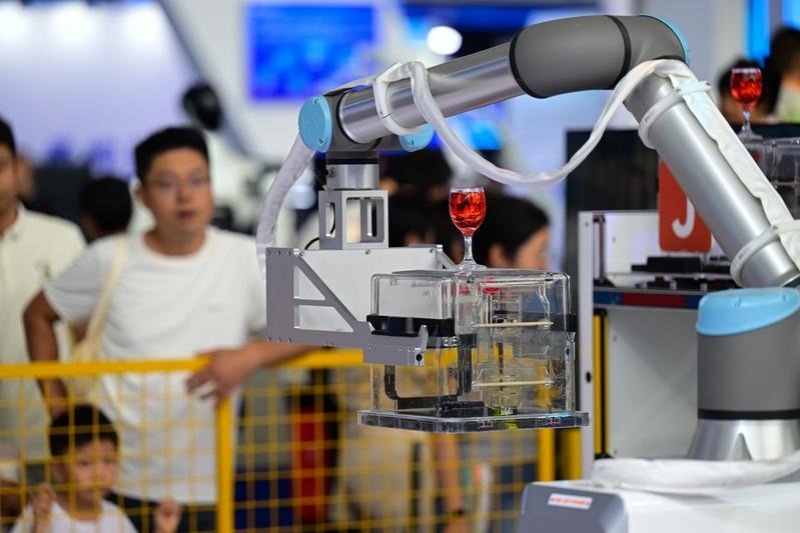News in review


Monday
____Feb 27380'underground banks'broken up in 2016
China's police authority said it busted more than 380 "underground banks" last year, involving more than $131 billion (900 billion yuan) as the authorities attempt to stem an exodus of cash flowing out of the country.
The Ministry of Public Security said in a statement on its website on Sunday that more than 800 suspects involved in money laundering were arrested and it found that illegal banking operations were "rampant" across the country, helped by the emergence of internet finance and new online payment methods.
Weighed on by a weak Chinese yuan against the US dollar, regulators have moved to crack down on illegal cross-border capital flow in the past few months, while reiterating that normal business will not be affected and foreign investment is welcome.
Profits of securities firms declined in 2016
Fifteen Chinese listed brokerages, accounting for more than half of the country's publicly traded securities firms, have estimated profit declines for the last year as thin stock trading dragged down their incomes in commission fees.
The brokerages reported combined net profits of $7.8 billion (53.66 billion yuan) in their preliminary earnings estimates for 2016, only half of the figure seen in 2015, according to RoyalFlush Information, a financial information service provider.
Total revenues declined nearly 40 percent to 164.87 billion yuan, mainly weighed on by substantial drops in commission fees.
Changjiang Securities Co saw the lowest profit decline, while CITIC Securities Co appeared to be the most profitable brokerage.
Despite lackluster brokerage charges, securities companies saw expanding asset management and investment banking business last year, which grew 8 percent and 29 percent in terms of net income, respectively, data from the Securities Association of China showed.
Tuesday____Feb 28
Truck-test cheats worsen air pollution
Some drivers in Tangshan, a city in northern China's Hebei province, including drivers of heavy trucks, reportedly paid local "test brokers" so their vehicles passed the compulsory annual tests for all road vehicles without actually taking them. Beijing News commented on Monday:
At a cost of just 1,000 yuan ($145), all kinds of vehicles, including trucks with excessive exhaust emissions, can be "properly dealt with" so they pass the annual tests, according to Tangshan brokers.
Turning a blind eye to the polluting trucks, one of which can generate more emissions than more than 200 new sedans, deals a severe blow to anti-pollution efforts.
The great number of trucks from neighboring provinces such as Hebei and Shandong entering and departing Beijing day in, day out, imposes an extra burden on the capital's air quality.
Officer ordered to stop forcing people to write
A city traffic officer who stopped jaywalkers and errant bicycle riders, and made them fill a notebook page with the phrase "Red for stop, green for go", has been ordered to stop it.
Ji Xuefeng, an auxiliary traffic officer in Linfen, Shanxi province, made rule-breakers fill an entire page in a notebook before he would let them go - a method he insists has helped change people's behavior. "Most people I've punished this way haven't done it again," Ji told Xinhua.
An officer for 16 years, Ji first started to use his method in 2002 on jaywalkers, bicyclists and drivers of electric scooters who ran red lights. (Photo 1)
Wednesday____March 1
Incentives for a second child being considered
China is mulling financial incentives - "birth rewards and subsidies" - to encourage couples to have a second child, as surveys show many are reluctant to expand their families due to economic constraints.
Wang Pei'an, vice-minister of the National Health and Family Planning Commission, revealed the potential move at a social welfare conference on Saturday. It is the first time that the top population authority has suggested such a move to boost the birthrate, according to Yuan Xin, a professor at Nankai University in Tianjin.
Top decision-makers last year relaxed the more than four-decade-old family planning policy to allow, if not encourage, Chinese couples to have a second child. Nationwide, the change led to 17.8 million births in 2016, an increase of more than 1.3 million compared with the previous year and the biggest annual increase in 20 years.
A 2015 survey by the commission found that 60 percent of families polled expressed reluctance to have a second baby largely due to economic constraints. (Photo 2)
Coal use drops for the third consecutive year
Coal burning in China in 2016 dropped for the third consecutive year, and the decline of China's coal usage may have become a long-term trend, according to economists.
Coal consumption, a major source for carbon dioxide emissions, dropped by 4.7 percent in 2016, the biggest year-on-year decline since 2014, according to the annual Statistical Communique on Economic and Social Development, released by the National Bureau of Statistics.
The share of coal in China's energy mix dropped to 62 percent in 2016 from 64 percent in 2015. (Photo 3)
Thursday____March 2
Newest combat drone makes maiden flight
China's latest combat drone made its maiden flight and is set to be "the biggest export deal" of any Chinese-made unmanned aircraft, according to the drone's designer.
A prototype of the Wing Loong II conducted a 31-minute test flight from an unidentified airport on Monday morning, according to a news release by the State-owned Aviation Industry Corp of China.
Wing Loong II is China's first drone to be propelled by a turboprop engine. The design was based on its predecessor, Wing Loong I.
Wing Loong II can stay airborne for 20 hours and has a maximum speed of 230 miles per hour (370 kilometers). It can carrying up to 12 laser-guided bombs or missiles with a total weight of 1,058 pounds (480 kilograms). Wing Loong I can carry only two bombs or missiles with a combined weight of 220 pounds (100 kg). (Photo 4)
Animal saliva may aid in neurological diseases
Scientists have used animal saliva to produce a protein that could aid in the development of therapeutic drugs for neurological diseases like Alzheimer's and Parkinson's.
A research team led by Wu Zhenfang, a professor of animal science specializing in molecular genetics and breeding at South China Agricultural University, used the salivary glands of transgenic mice as bioreactors to produce nerve growth factor, which regulates neurons in the brain and spinal cord.
"Salivary glands of animals have great potential to act as powerful bioreactors to produce human therapeutic proteins," according to the research report.
The team's findings were published late last month in Scientific Reports, an online journal published by Nature.
Friday____March 3
500,000 laid-off workers need new jobs
China needs to re-employ an additional 500,000 workers who were laid off as a result of production cuts in the coal and steel industries this year.
Human Resources and Social Security Minister Yin Weimin told a news conference that 726,000 workers from 1,905 companies in the coal and steel industries were re-employed last year.
In May, the Ministry of Finance announced $14.5 billion (100 billion yuan) in aid for coal and steel companies to resettle workers who had been made redundant, with about 30 billion yuan having been used last year. Local governments have also been asked to provide financial support and create jobs for workers who are unemployed as a result of production cuts.
Despite facing downward pressure on economic growth, the government plans to keep the unemployment rate in urban areas below 4.5 percent, according to a top human resources official.
In 2016, China created 13.1 million new jobs for urban residents, marking the fourth consecutive year in which more than 13 million new jobs were created.
The country also faces a challenge this year to create jobs for almost 7.95 million university graduates, 300,000 more than last year.
Rural teachers given living subsidies in 2016
Nearly 1.3 million rural teachers received living subsidies in 2016, 346,000 more than in 2015, the Ministry of Education said.
Living subsidies covered 96.6 percent of rural teachers in impoverished areas last year, according to the ministry.
The subsidies benefited 81,000 schools in total in 2016, an increase of 14,000 from 2015, the ministry said.
|
Panda Qi Yi and friends cling tightly to a worker's legs at the Chengdu Research Base of Giant Panda Breeding in Sichuan province on Feb 24.A video of the 7-month-old cub's antics went viral online, and was viewed more than 56.7 million times on Sina Weibo, China's version of Twitter. She Yi / Asianewsphoto |
(China Daily USA 03/03/2017 page12)
Today's Top News
- Japan's PM seen as playing to right wing
- Mainland increases entry points for Taiwan compatriots
- China notifies Japan of import ban on aquatic products
- Envoy: Japan not qualified to bid for UN seat
- Deforestation is climate action's blind spot
- Japan unqualified for UN Security Council: Chinese envoy































